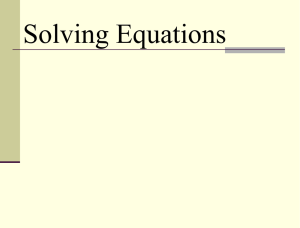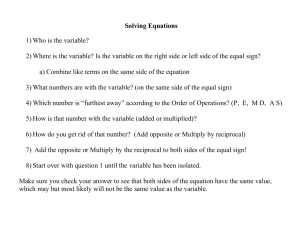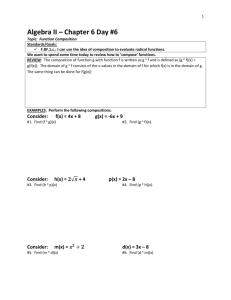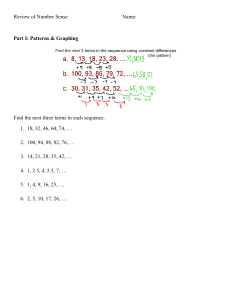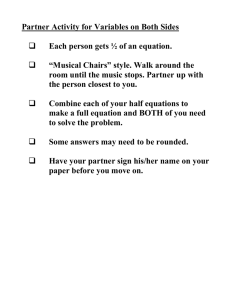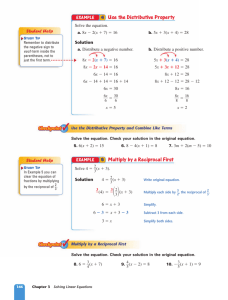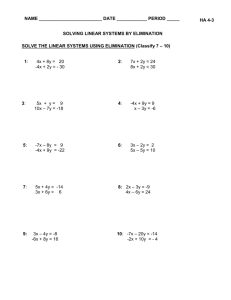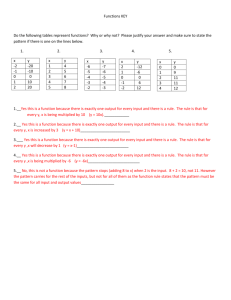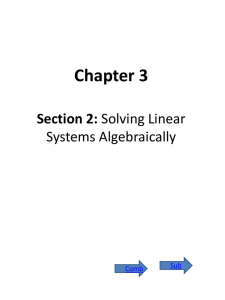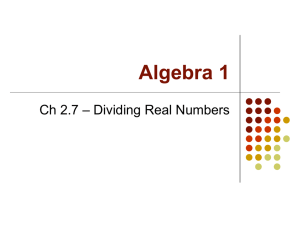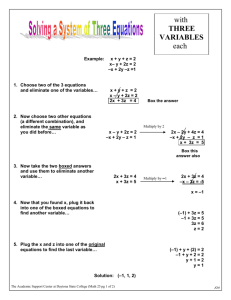Math 90A Test 2
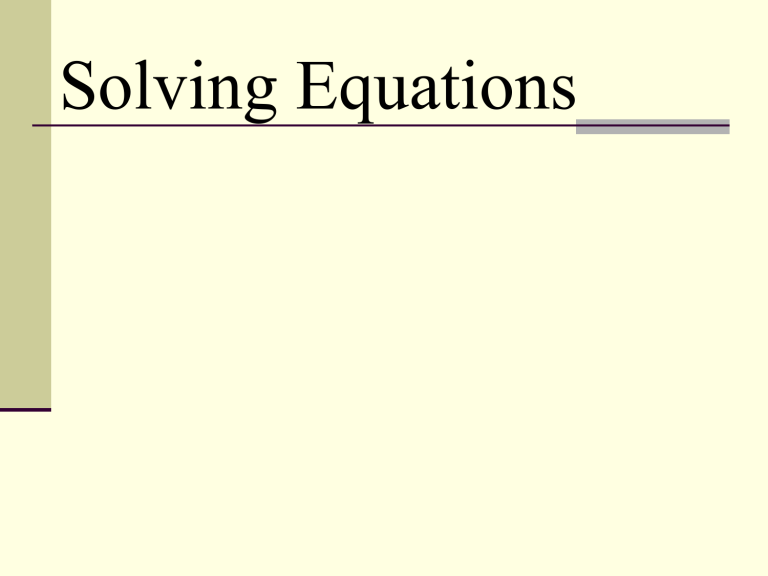
Solving Equations
Solving Equations
Equations contain an equal sign (or inequality) and at least one variable.
What is your Goal?
Find what value(s) make the equation true.
How do you accomplish it?
Isolate the variable.
Get rid of the furthest number that is “with” the variable first.
Solve :Isolate the variable.
If added,
then add the opposite
If multiplied,
then multiply by the reciprocal
How do you know you are correct?
Put your answer back into the original equation to see if both side have the same value.
Questions to focus on
Who is the variable?
Where is the variable?
Is the variable on the right side or left side of the equal sign?
Combine like terms on the same side of the equation
What numbers are with the variable?
(on the same side of the equal sign)
Which number is “furthest away” according to the
Order of Operations? (P, E, M D, A S)
Questions to focus on
How is that number with the variable
(added or multiplied)?
How do you get rid of that number?
(Add opposite or Multiply by reciprocal)
Add the opposite or Multiply by the reciprocal to both sides of the equal sign!
Start over with the first question until the variable has been isolated.
Solve and check your answer.
2 3
Solve and check your answer.
2 3
2
3
5
w
3
3
Check:
2
3
2
2
Solve and check your answer.
y
10
5
Solve and check your answer.
y
10
5 y
5 5 10
5
y
50
Check:
5
10
Your turn to try a few problems
Solve and check your answer.
(2 operations)
3x + 5 = 20
Solve and check your answer.
(2 operations)
3x + 5 = 20
3x + 5 – 5 = 20 – 5
3x = 15
3x = 15
-3 -3 x = 5
Check:
3(5) + 5 = 20
20 = 20
Solve and check your answer.
(2 operations)
7 = 4 – 6x
Solve and check your answer.
(2 operations)
7 = 4 – 6x
7 – 4 = 4 – 4 – 6x
3 = -6x
3 = -6x
-6 -6
-1/2 = x
Check:
7 = 4 – 6( )
7 = 4 – 6( -1/2 )
7 = 4 – -3
7 = 4 + 3
7 = 7
Your turn to try a few problems
Solve and check your answer.
(variables on the same side of equation)
5x + 2 – 4x = 6
Solve and check your answer.
(variables on the same side of equation)
5x + 2 – 4x = 6
Check:
5x – 4x + 2 = 6
5(4) + 2 – 4(4) = 6
1x + 2 = 6
20 + 2 – 16 = 6 x + 2 – 2 = 6 – 2
22 – 16 = 6 x = 4 6 = 6
Solve and check your answer.
(variables on both sides of the equation)
4x – 7 = 6x + 2
Solve and check your answer.
(variables on both sides of the equation)
4x – 7 = 6x + 2
4x +
-
4x +
-
7 = 6x +
-
4x + 2
-
7 = 2x + 2
-
7 + -2 = 2x + 2 + -2
-
9 = 2x
Check:
4(-9/2) – 7 = 6(-9/2) + 2
-18 – 7 = -27 + 2
-9 = 2x
2 2 -18 + -7 = -27 + 2
-9/2 = x -25 = -25
Solve and check your answer.
(variable s on 1 sides of the equation)
2x + 3(x – 4) = 13
Solve and check your answer.
(variable s on 1 sides of the equation)
2x + 3(x – 4) = 13
2x + 3(1x +
-
4) = 13
2x + 3x +
-
12 = 13
5x +
-
12 = 13
5x +
-
12 + 12 = 13 + 12
5x = 25
5x = 25
5 5 x = 5
Check:
2(5) + 3((5) – 4) = 13
10 + 3(1) = 13
10 + 3 = 13
Your turn to try a few problems
Types of solutions:
No solution , there is no value for the variable that will make the equation true.
5 = 2
A unique answer , there is at least one value that makes the equation true. x = number
Infinite number of solutions , all real numbers makes the equation true.
3 = 3
Solve for x.
x + 2 = x – 4 x – x + 2 = x – x – 4
2 = -4
No Solution
Solve for x.
2x – 1 = x + 5
2x – x – 1 = x – x + 5 x – 1 = 5 x – 1 + 1 = 5 + 1 x = 6 unique solution
Solve for x.
x + 4 = 4 + x x – x + 4 = 4 + x – x
4 = 4
Infinite number of solutions
